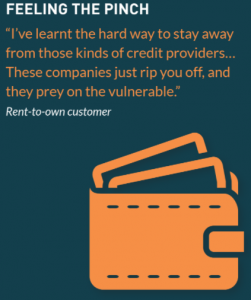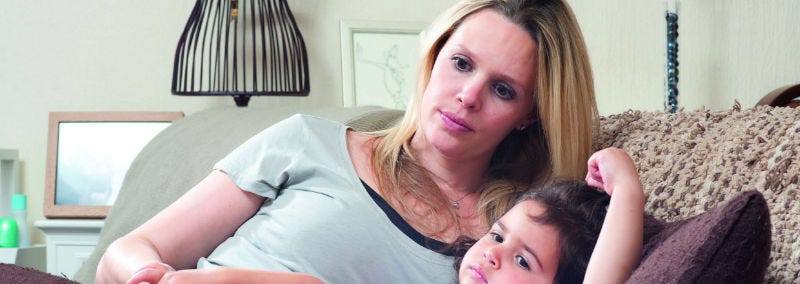Paying a high price: rent-to-own household goods
Posted on 23 Nov 2017 under News, Poverty Premium
On 13 November 2017 the APPG on Poverty and APPG on Debt and Personal Finance held a parliamentary reception to launch End Child Poverty’s new report, Feeling the Pinch: Furnishing Your Home with Rent-to-own
This report from the End Child Poverty (ECP) coalition and StepChange investigates the experiences of low income households with little choice but to cover the costs of basic household goods through high cost rent-to-own companies like BrightHouse. The rent-to-own sector has come under the spotlight recently as part of the Financial Conduct Authority’s High Cost Credit review. Their report comes at a crucial time, with Members across both Houses of Parliament raising concerns about how to tackle irresponsible lending practices and high levels of consumer debt.
“We feel we have no choice but to sign contracts so we can have normal everyday household items like a fridge… if you do not pay on time, this can lead to not only financial problems in the family but health issues as well, depression and anxiety where the money is coming from to pay if the person is already struggling with other payments e.g. rent, council tax and other bills. You can get into a real mess.”
Rent-to-own customer
Rising inflation and a freeze in benefits, tax credits and housing assistance means low income households are facing real financial difficulties. And with no option but to turn to high cost credit for basic household items.
-
Download the report: Feeling the Pinch: Furnishing Your Home with Rent-to-own
-
Take action using ECP’s Rent-to-Own Campaign Toolkit
-
Ask your MP to write to the Government calling for action to protect low-income consumers. ECP’s campaign asks:
1) the Financial Conduct Authority to regulate the rent-to-own sector more tightly by capping the total cost of goods bought through rent-to-own
2) the Government to promote better access to affordable credit by creating a national interest-free credit scheme available to anyone eligible for Universal Credit
The high cost of furnishing your home with rent-to-own
By Laura Rodrigues, Senior Public Policy Advocate, StepChange. This blog was originally posted on Medium

A new campaign from the End Child Poverty coalition has found that financially vulnerable families could be paying around three times more for basic household items when renting-to-own, compared to the price they’d pay up front.
Rent-to-own stores sell household items, such as washing machines and fridges, usually on a ‘pay weekly’ basis. This is often the only choice for some families on low incomes who have no access to savings and who cannot afford to pay for goods outright.
However, there’s a high cost attached. Having to pay off the goods over a number of years (three on average) can cost more than two or three times what they would cost if bought outright from a high street retailer.
New campaign about rent-to-own launches
The new campaign (launched today) from the End Child Poverty coalition(ECP) finds that families could face paying just over £9,000 over three years for a set of ten basic consumer items, including a sofa and washing machine. Similar items could cost as little as £3,000 if paid for up front. Those families who can least afford it are having to pay more to own essential household goods.
This is not a small issue, with the Financial Conduct Authority (FCA) finding that at the end of 2016, 400,000 people had outstanding rent-to-own debts, with a value of £500 million.
Supporting the ECP campaign
We’re members of the ECP coalition, and as part of the campaign we’re highlighting our clients’ experiences of using rent-to-own. Our clients found they had few alternative options:
“I looked at getting [goods] second hand, but I still couldn’t afford them.”
“I asked other retailers for credit, but was unsuccessful.”
“I [considered] buying from [high street retailer], but didn’t have the money for it.”
What alternatives are available for families on low incomes who need essential household goods?
Our research found that 1.1 million people [PDF] used high cost credit for essentials in 2016.
We’ve called for the government to introduce, or underwrite, the development of a new scheme of low and no interest loans to help the most financially vulnerable, those who cannot access affordable credit.
The ECP report finds that the amount of interest-free credit through the government’s Social Fund has halved in the last seven years. In 2010 nearly £800 million per year was available for families needing help, compared to little more than £400 million in 2017.
The ECP is also calling for improved access to interest-free credit from the government, to help low income families purchase household goods without having to resort to high cost credit.
Alongside this there’s also a need for more effective and stronger regulation of rent-to-own providers.
We recommend a price cap
We endorse the ECP’s call for the FCA to ensure that the prices charged by rent-to-own providers are reasonable, including a price cap that encompasses the cost charged for goods as part of rent-to-own agreements.
Additionally, there must be improved safeguards for those in financial difficulties, to prevent households seeing essential goods being taken away even where substantial repayments have been made towards them.
We’ll continue to work with ECP, the FCA and the government to ensure stronger regulation of the rent-to-own sector and improved access to more affordable alternatives for the financially vulnerable.


Comments